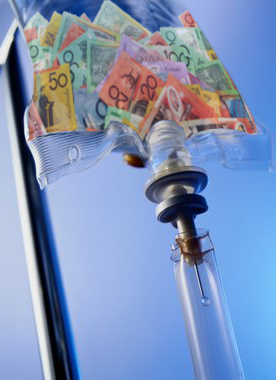States react to new fiscal view
 State governments have given a mixed reading of this week’s Budget, depending largely on the political leaning of their leaders.
State governments have given a mixed reading of this week’s Budget, depending largely on the political leaning of their leaders.
New South Wales Treasurer Gladys Berejiklian praised the Budget as good for both jobs and growth.
Ms Berejiklian said the increase to the upper limit of the middle-income tax bracket and reduction of the small businesses' tax rate to 27.5 per cent would help “support economic growth, lift business and consumer confidence and support jobs”.
NSW is also excited about a $2.2 billion funding pledge for public transport projects.
Similarly in WA, Premier Colin Barnett said the tax changes and other concessions would benefit the state, but shadow treasurer Ben Wyatt said they would do nothing to promote jobs and growth.
Western Australia's Chamber of Commerce and Industry (CCI) says any new money would help, given the state's recent fiscal troubles.
Reading the same deals differently, South Australia's Treasurer Tom Koutsantonis has described the federal budget as “underwhelming and uninspiring”.
“They haven't restored the health and education funding that they cut away in 2014, and they've made dramatic cuts to aged care facilities and mental health care programs,” he said.
Mr Koutsantonis did welcome the tax cuts for small business.
In Victoria, the Andrews Labor Government saw very little good news in Tuesday night's budget announcement.
“Victorians continue to be ripped off on infrastructure funding, with Victorian taxes continuing to pay for projects in Sydney and Brisbane,” Victoria’s Treasurer Tim Pallas said.
“Malcolm Turnbull has also failed the test of national leadership on family violence, providing $472 million less than Victoria to combat this national emergency.”
Victorian opposition treasury spokesman Michael O'Brien welcomed funding for schools, health, infrastructure projects, and the $750 million plan for young jobseekers.
Queensland Treasurer Curtis Pitt will see an additional $1.3 billion in GST payments flow to state coffers due to the downturn in the mining sector.
But the money falls short of former health and education promises that were scrapped by the Abbott Government.
The Palaszczuk Government is expected to turn the lack of previously-pledged funding into an election issue in coming weeks.
Tasmanian premier Will Hodgman gave Scott Morrison's financial plan a general thumbs up, despite the disappearance of a number of funding commitments.
“Fundamentally this is a good budget for Tasmania, it's a plan for economic growth, it supports small business and when you consider that Tasmania's economy is fuelled by the small business sector then this is going to have a significant benefit,” Mr Hodgman told reporters.
The budget papers contained nothing about the $150 million co-contribution for a new University of Tasmania campus, something the state’s Labor opposition has promised to fulfil.
Mr Hodgman said his administration was making strong representations to Canberra.
“Over the coming weeks, eight or so of them, there will be election commitments made as well and I'm sure there will be further positive announcements out of that process,” the premier said.







 Print
Print